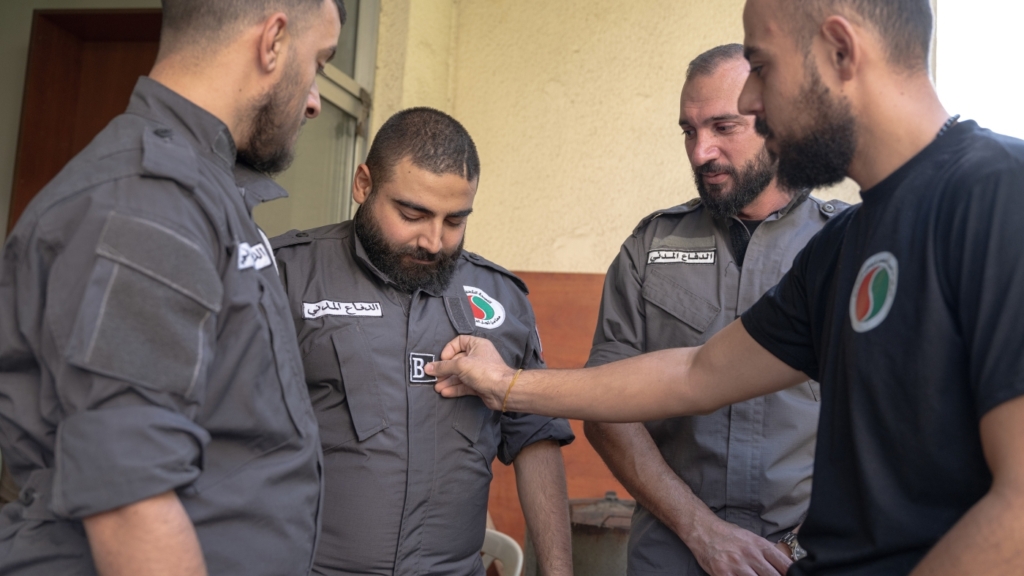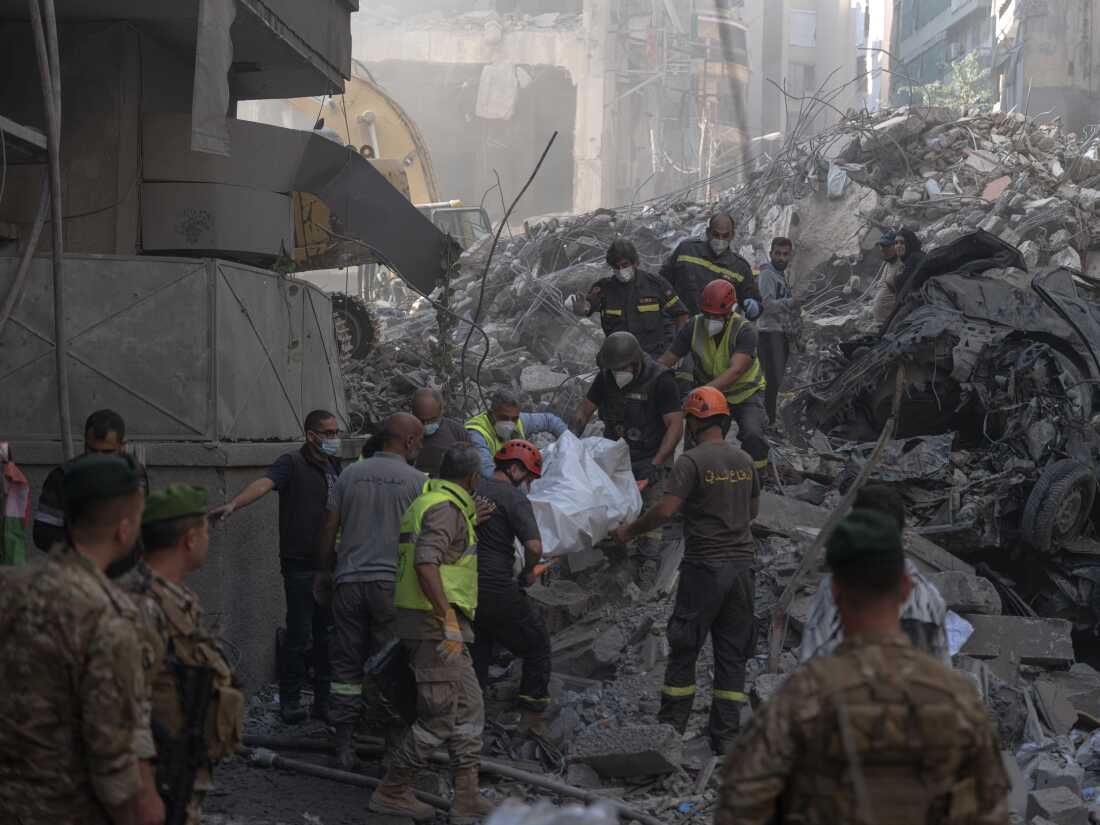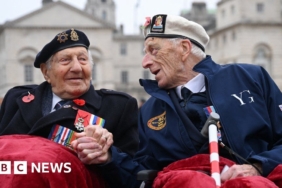Bu içerik, Lübnanlı Popular Relief Association’da gönüllü olarak çalışan Jad Deeb’in hikayesini anlatıyor. Deeb, günlük hayatında bir IT uzmanı olmasına rağmen, İsrail’in Hezbollah’u etkisiz hale getirmek için başlattığı hava saldırıları sonrasında enkaz altında kalan insanları kurtarmak için gönüllü olarak çalışmaya başlamıştır. Kendisi ve ekibi, genellikle kendilerini tehlikeye atan durumlarla karşılaşmış, ancak yardım etmekten vazgeçmemişlerdir. İçerikte, Deeb’in çalışmaları ve gönüllü olarak yaptığı fedakarlıklar anlatılmaktadır. Ayrıca, içerikteki görsellerle de desteklenmiştir. Jad Deeb, a volunteer of the Lebanese Popular Aid Society, discusses the dangers he faces as a first responder in Lebanon, particularly during the current conflict between Israel and Hezbollah. Deeb believes that first responders are being targeted by the Israeli military, citing instances where they were warned to leave sites or face bombing. The Lebanese Ministry of Health has reported over 200 first responders and medical workers killed in Lebanon during this conflict, with accusations of Israeli targeting. Human Rights Watch has documented cases of Israeli forces striking medical personnel and facilities, describing them as “apparent war crimes.” This article sheds light on the risks faced by first responders like Deeb in a war-torn environment. Bu içerikte, Jad Deeb’in bir meslektaşı, kan grubunu belirten bir yamayı Deeb’in gömleğine yapıştırıyor. Deeb, Lübnan Halk Yardım Derneği’nin bir gönüllüsü olarak, toplumsal destek çabalarının bir parçası olarak iş arkadaşlarından bağışlar topluyor. İsrail, Hizbullah’a karşı başlatılan bu savaştan önce ilk yardım ekiplerini ve sağlık çalışanlarını hedef alma suçlamasıyla karşı karşıya kaldı. Lübnan’da, İsrail’in 2006’daki son Hizbullah savaşında, çeşitli uluslararası kuruluşlar, İsrail’in Kızılhaç veya Kızılay simgeleri ile açıkça işaretlenmiş ambulansları hedef aldığı sonucuna vardı. İsrail’in askeri gücü, belirli acil araçları hedef almadığını inkar etmiyor. Lübnan’da, İsrail Hizbullah’ı savaşçıları ve silahları ambulansların içine taşımak ve saklamakla suçluyor, ancak İran destekli militan grup bu taktiği kullanmadığını iddia ediyor. İsrail, Hamas’ı aynısını Gazze’de yapmakla suçluyor. Gaza’da, İsrail’in Hamas’ı 7 Ekim saldırısını takiben son bir yıldır ortadan kaldırmaya çalıştığı yerde, Dünya Sağlık Örgütü’ne göre 500’den fazla sağlık çalışanı öldürüldü. Yüzlercesi, Gazze’nin sağlık bakanlığına göre İsrail’in gözaltında. İsrail’in son Hizbullah savaşında, 2006’da, İsrail’in Lübnan’daki Kızılhaç veya Kızılay simgeleri ile belirtilen ambulansları hedef aldığı sonucuna varan uluslararası kuruluşlar vardı. The article discusses the response of search-and-rescue teams to the aftermath of Israeli strikes in Beirut, Lebanon on November 23, 2024. It highlights the challenges faced by volunteer first responders, their experiences, and the impact of the conflict on the community. The article also sheds light on Israel’s military operations and allegations of Hezbollah’s use of ambulances and medical facilities for illicit purposes. Additionally, it includes quotes from Israeli military officials and social media posts related to the conflict.
“I don’t remember the last time I slept for eight hours in one go,” says Deeb. “I wish I could do that. I wish I could sleep without dreaming of war.”
Despite the trauma and exhaustion, Deeb and his colleagues continue to work tirelessly, saving lives and providing support to those affected by the conflict. Their dedication and sacrifice embody the spirit of resilience and solidarity in the face of adversity. This content discusses the work of first responders in Beirut, Lebanon, who are distributing donated food, water, and medicine to displaced families following Israeli airstrikes. The team also provides aid to those living on the streets, in schools, and in mosques in neglected areas of the city. The article highlights the challenges faced by emergency workers, who are not only helping others but also worrying about their own safety and the safety of their loved ones. The text also mentions the parallels drawn between the displacement in Lebanon and the situation in Gaza, with concerns about becoming targets of the conflict. Additionally, images capturing the aftermath of Israeli airstrikes and the response of emergency workers are included in the content. The content includes images of the aftermath of an Israeli airstrike near Rafik Hariri University Hospital in Beirut, Lebanon, on October 22, 2024. The images show a firefighter at the site of the strike and provide a glimpse into the devastation caused by the attack, which resulted in the deaths of 18 people, including children. The caption also mentions the efforts of first responders, including Deeb’s team, who worked tirelessly to rescue victims trapped under the rubble. Additionally, there is an image of Jad Deeb, a volunteer of the Lebanese Popular Aid Society, resting in his office in Beirut during a brief lull in airstrikes. Bu içerik, savaş ve doğal afetlerin yol açtığı acımasız sonuçlara tanıklık eden bir kurtarma görevlisinin hikayesini anlatıyor. İçerikte, görevlinin ailesini düşündüğü ve onların da aynı kaderi paylaşma ihtimalini endişeyle karşıladığı vurgulanıyor. Aynı zamanda, savaşın devam etmesi durumunda kendi ailesinin de benzer bir felakete maruz kalabileceği endişesi dile getiriliyor. Görseldeki fotoğrafın kredisi Ali Khara’ya ait. Bu içerikte, içerik oluşturma sürecinde içerik açıklaması nasıl hazırlanır ve önemi nedir konuları ele alınmaktadır. İçerik açıklaması, bir içeriğin ne hakkında olduğunu, kimler için olduğunu ve hangi konuları kapsadığını özetleyen bir metindir. İçerik oluştururken doğru hedef kitleye ulaşmak ve içeriğin etkili olmasını sağlamak için içerik açıklamasının titizlikle hazırlanması gerekmektedir. Bu içerik, içerik açıklamasının nasıl oluşturulacağına dair ipuçları ve önemli noktaları içermektedir. Bu içerik, içerik açıklaması oluşturma sürecini tanımlamak ve adım adım nasıl yapılacağını açıklamak için hazırlanmıştır. İçerik açıklaması, bir içeriğin özetini vererek okuyucuların içeriğin ne hakkında olduğunu anlamasına yardımcı olur. Bu içerik, içerik oluşturucuların içerik açıklamalarını nasıl oluşturabileceğini öğrenmelerine yardımcı olmayı amaçlamaktadır.
[ad 1]
Kaynak: www.npr.org


















Yorumlar kapalı.